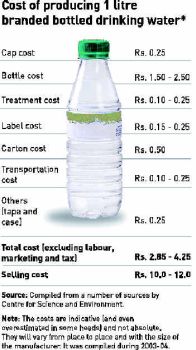
From the above figure, it is clear that
the total cost on a water bottle is Rs. 2.85 - 4.25 (excluding labour, marketing and tax)
But the selling cost is 10.00 to 12.00
Take for instance the case of Coca-Cola's bottling plant in drought-prone Kala Dera near Jaipur. Coca-Cola gets its water free except for a tiny cess (for discharging the wastewater) it pays to the State Pollution Control Board - a little over Rs.5,000 a year during 2000-02 and Rs.24,246 in 2003. It extracts half a million litres of water every day - at a cost of 14 paise per 1,000 litres.
So, a Rs.10 per litre Kinley water has a raw material cost of just 0.02-0.03 paise.
(It takes about two to three litres of groundwater to make one litre of bottled water.)
However, water is not that cheap in the United States, home to Coca-Cola and PepsiCo. The average cost of industrial water in the U.S. was Rs.21 per 1,000 litres in the late 1990s. It was Rs.90/1,000 litres in the United Kingdom and Rs.76/1,000 litres in Canada.
Huge real costs
The reason that companies do not have to bear the cost of the main raw material - water - has made this industry highly profitable. But the real cost of the industry is huge.
The cost of fast-depleting groundwater is incalculable and so is the cost of disposal of plastic bottles and pouches. These are hidden costs that society and the environment pay and will pay in the future. The sale of bottled water is therefore not environmentally sound by any stretch of the imagination.
There are much cleaner ways to access clean and healthy water and for this we will have to rethink our water paradigm.
Groundwater is the cleanest and cheapest source for all, but we have over-extracted and polluted it with natural contaminants, agro-chemicals and industrial waste. We will have to recharge and revive our groundwater bodies and for this the existing archaic law must change.
Our surface water bodies are in a deplorable condition. We dump our sewage and industrial waste in rivers and ponds, try to clean them in massive centralised treatment plants and then supply the water to urban households - to be discharged again as wastewater into the same waterbody. This vicious cycle must be cut and stopped. The cost of dirty water is just too great for society to bear. Bottled water and domestic treatment systems are a cheap as well as fill-and-forget solution for 30 per cent of the population, but in doing so we have not left any solution for the 70 per cent of the poor and the marginalised.
(Excerpts from an article in Frontline dated April 08-24, 2006, Written by Chandra Bhushan, Associate Director, Centre for Science and Environment, New Delhi.)

No comments:
Post a Comment